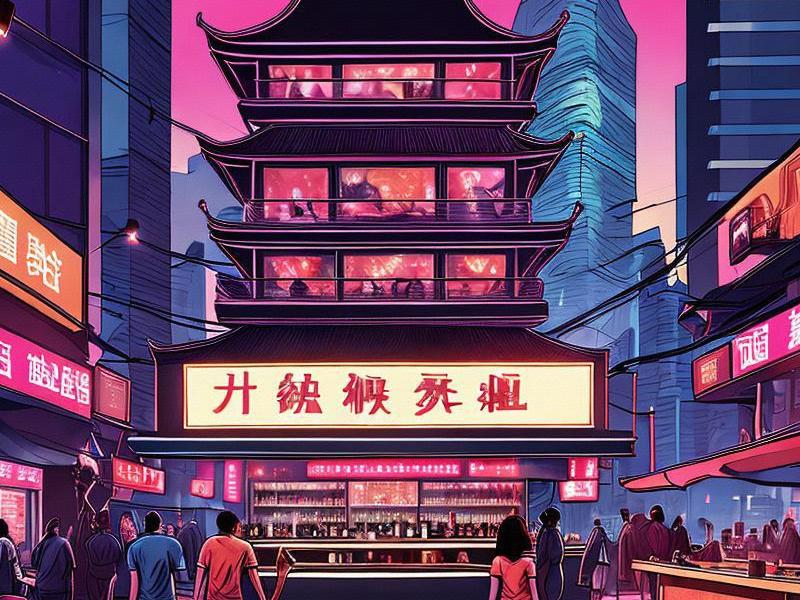
Shanghai, a global metropolis known for its blend of tradition and modernity, boasts a dynamic nightlife scene that includes a wide array of entertainment clubs. These venues, ranging from high-end nightclubs to more intimate bars and lounges, serve as hubs for socializing, networking, and entertainment, reflecting the city's diverse cultural landscape and evolving social dynamics.
The entertainment club scene in Shanghai has grown exponentially over the past few decades, mirroring the city's rapid economic development and urbanization. In the early days, Shanghai's nightlife was characterized by traditional teahouses and cabarets, which offered a glimpse into the city's rich cultural heritage. However, with the influx of foreign investment and the rise of a new middle class, the entertainment industry has undergone a significant transformation, giving rise to a more cosmopolitan and sophisticated nightlife.
Today, Shanghai's entertainment clubs are a melting pot of cultures, attracting locals and tourists alike. These venues offer a wide range of experiences, from live music and DJ performances to themed parties and exclusive events. The city's top clubs, such as M2 in the Bund and Bar Rouge in Lujiazui, are known for their state-of-the-art sound systems, world-class DJs, and stunning views of the city skyline. These establishments have become iconic landmarks, symbolizing Shanghai's status as a global entertainment capital.
The nightlife scene in Shanghai is not just about entertainment; it also serves as a platform for social interaction and networking. Many professionals and entrepreneurs frequent these venues, using them as places to unwind after work or to make valuable business connections. The clubs often host events such as industry mixers, charity fundraisers, and fashion shows, further cementing their role in the city's social fabric.
上海龙凤千花1314 However, the rapid growth of Shanghai's entertainment club scene has also raised concerns about its impact on urban life. Critics argue that the noise, overcrowding, and late-night operations of these venues can disrupt the peace and tranquility of residential neighborhoods. Additionally, there are concerns about the potential for illegal activities, such as drug use and prostitution, which have been reported in some clubs.
In response to these concerns, the Shanghai municipal government has implemented a series of regulations aimed at ensuring the safety and well-being of residents while preserving the city's vibrant nightlife. These regulations include restrictions on operating hours, noise control measures, and mandatory background checks for club staff. The government has also launched campaigns to raise awareness about the dangers of drug use and other illegal activities, encouraging responsible behavior among club-goers.
Despite these challenges, the entertainment club scene in Shanghai continues to thrive, reflecting the city's dynamic and resilient spirit. The clubs have adapted to changing social norms and preferences, offering a diverse range of experiences that cater to different tastes and lifestyles. For example, some venues have introduced live music performances by local artists, promoting the city's burgeoning music scene. Others have embraced sustainability, incorporating eco-friendly practices such as energy-efficient lighting and waste reduction initiatives.
上海龙凤419自荐 The impact of Shanghai's entertainment clubs extends beyond the city's borders, influencing the broader entertainment industry and cultural landscape. Many of the DJs, musicians, and performers who gain fame in Shanghai go on to achieve international success, contributing to the global exchange of ideas and talent. The city's nightlife has also become a source of inspiration for filmmakers, writers, and artists, who draw upon its vibrant energy and unique atmosphere in their work.
Moreover, the entertainment club scene plays a significant role in shaping Shanghai's identity as a modern metropolis. It reflects the city's openness to new ideas and cultures, as well as its ability to blend tradition with innovation. The clubs serve as a testament to Shanghai's status as a global hub for commerce, culture, and entertainment, attracting visitors from around the world who come to experience its unique charm and vibrancy.
However, the future of Shanghai's entertainment club scene will depend on the ability of stakeholders to strike a balance between preserving the city's nightlife culture and addressing the concerns of residents and regulators. This requires ongoing dialogue and collaboration among government agencies, club owners, and the community to develop sustainable solutions that benefit all parties involved.
上海品茶网 One potential solution is the establishment of designated entertainment districts, where clubs and other nightlife venues can operate under a unified set of regulations and guidelines. This approach would help to minimize the impact of noise and overcrowding on surrounding neighborhoods while creating a vibrant and concentrated entertainment hub. Additionally, the use of technology, such as mobile apps and social media platforms, can enhance the customer experience by providing real-time information about club events, promotions, and safety measures.
Another important consideration is the need to promote responsible behavior among club-goers. This can be achieved through educational campaigns, community outreach programs, and partnerships with local organizations that support youth development and social responsibility. By fostering a culture of respect and accountability, the entertainment club scene in Shanghai can continue to thrive while minimizing its negative impact on urban life.
In conclusion, Shanghai's entertainment clubs are an integral part of the city's nightlife culture, reflecting its dynamic and diverse social fabric. These venues offer a wide range of experiences that cater to different tastes and lifestyles, serving as hubs for socializing, networking, and entertainment. While the rapid growth of the industry has raised concerns about its impact on urban life, ongoing dialogue and collaboration among stakeholders can help to address these challenges and ensure the continued success of Shanghai's entertainment club scene.
As the city continues to evolve and adapt to changing social norms and preferences, the entertainment club scene will remain a vital component of Shanghai's identity as a modern metropolis. By embracing innovation, sustainability, and social responsibility, the clubs can continue to attract visitors from around the world who come to experience the unique charm and vibrancy of Shanghai's nightlife.
